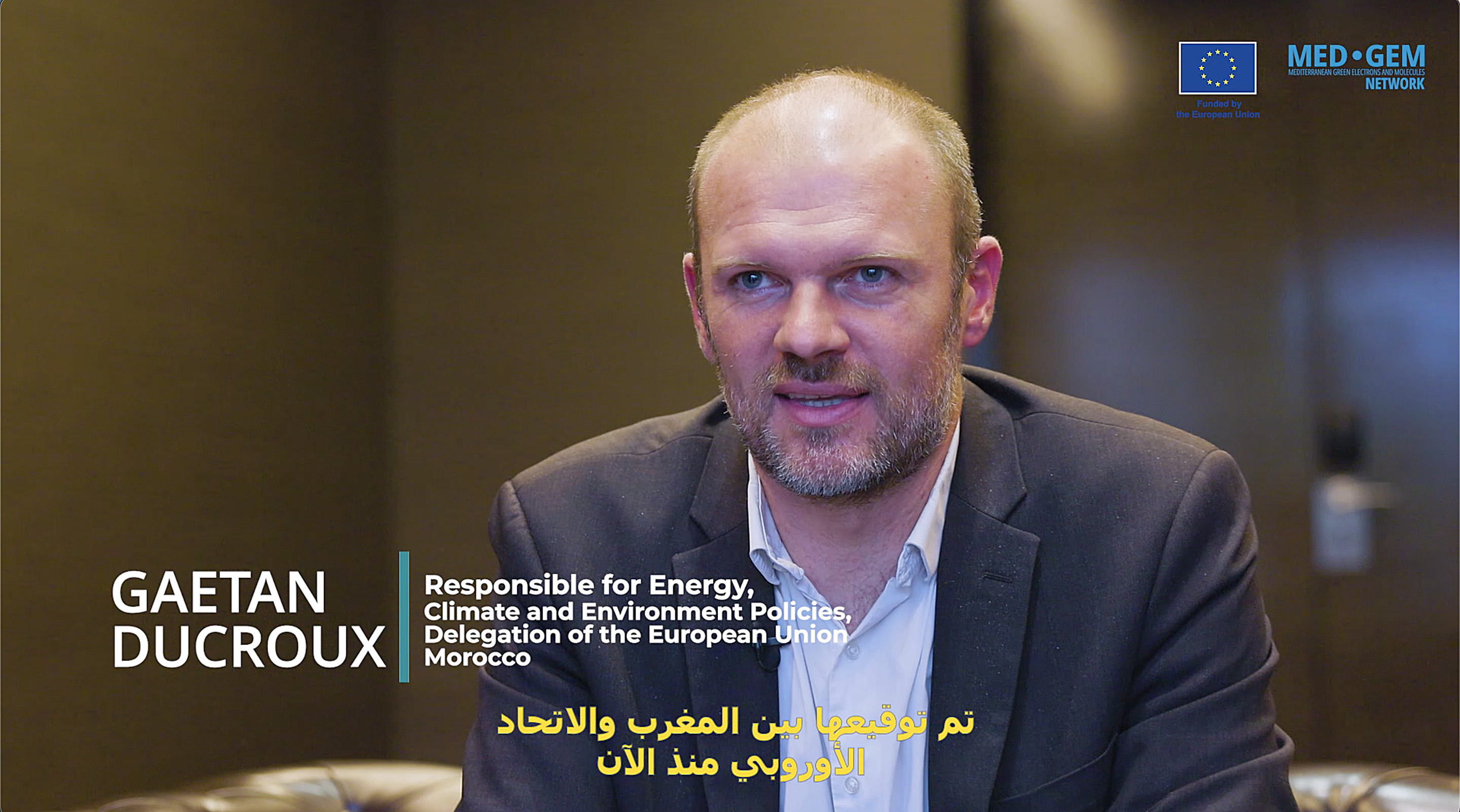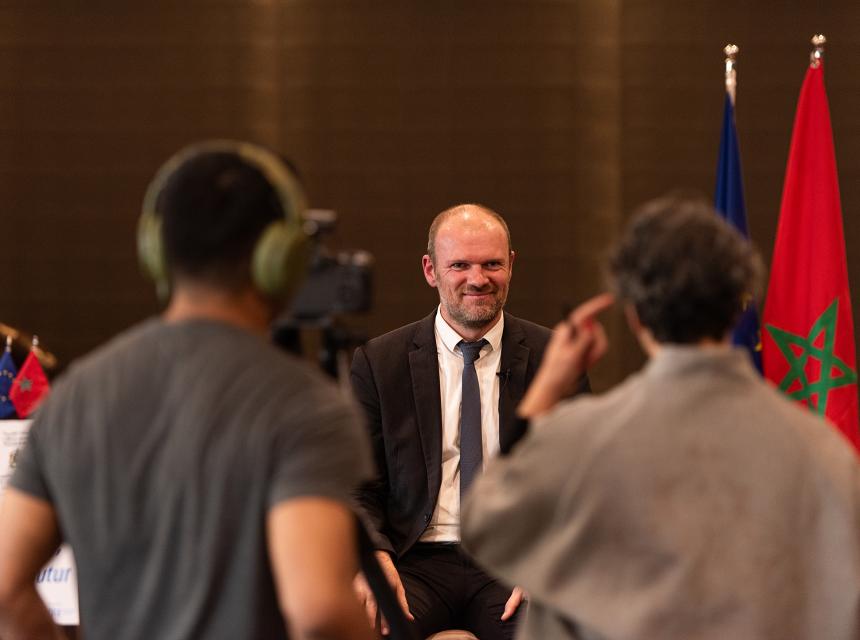The Green Partnership: The role of the EU in supporting the energy transition in Morocco: A Conversation with Gaetan Ducroux
In an insightful interview with Gaetan Ducroux late December 2023 in Rabat, the expert steering energy, climate, and environmental policies at the Delegation of the European Union (EU) in Morocco, we delved into the pivotal role played by the EU in advancing Morocco's energy transition. The focal point of our discussion revolved around the dynamic and impactful green partnership established between the EU and Morocco. We explored the current implementation of this partnership, shedding light on specific projects that the EU is actively supporting within the North African nation. We took a deep dive into the recent green hydrogen tender initiated by the European Commission, unraveling the potential avenues for Morocco's response. This exclusive interview also addressed the challenges encountered by the EU in Morocco while striving to execute vital partnerships, navigate the RePowerEU strategy, and realize the ambitious Green Deal.
Interview

🎬 Watch the video (in French with Arabic Subtitles)
"What is the European Union's 'Green Partnership' with Morocco, and how does it support sustainable energy initiatives in the region? »
In Morocco, we have a Green Partnership that was established with the European Union a little over a year ago, starting from October 2022. This partnership serves as a crucial political framework, allowing us to shape our collaboration on various green themes.
The Green Partnership covers a wide array of themes, with a significant emphasis on the energy transition and the decarbonization of the economy, representing a cornerstone of our collaborative efforts. Additionally, it encompasses activities related to climate change mitigation, adaptation, environmental protection, biodiversity conservation, the green economy, and various financial considerations. These horizontal issues play a vital role in achieving our shared objectives.
This partnership is extensive and reflects the strong bonds between us, fueled by Morocco's ambitious goals. The European Union, through its Green Deal, has initiated several actions to support the shared objectives. The essence of the Green Partnership lies in establishing a close dialogue, both technically and politically. Since its signing, there has been a noticeable increase in exchanges between leaders, commissioners, and Moroccan ministers, all working towards a common direction.
The recently concluded MED-GEM program, which conducted workshops in Rabat, aligns with the goals of the Green Partnership. Given the focus on energy transition, green hydrogen assumes a central role, emerging as a predominant pillar of this partnership. Morocco aims to position itself as a regional and global leader in green hydrogen, with substantial ambition from our Moroccan partners in this regard. This theme generates significant interest among Moroccan partners, and parallel developments are occurring in Europe.
Sustaining regular dialogue is crucial, especially considering the dynamic landscape of global initiatives around green hydrogen. Over the past year, there have been noteworthy developments at the regulatory level, in mobilizing financing, and in identifying key infrastructures to drive the decarbonization of the economy. Keeping our partners well-informed is essential to ensuring that Morocco can effectively position itself within the evolving regulatory framework and tap into potential financial support.
In essence, hydrogen plays a crucial role within the Green Partnership, embodying the collaborative efforts towards achieving a sustainable and decarbonized future.
« How does the Green Partnership practically manifest today in Morocco ? Are there already specific projects in place that you are supporting? »
Green hydrogen is a field that is still in development, and there are several pilot projects emerging in Morocco within the framework of the Green Partnership. The European Union provides technical assistance to support institutions such as the National Research Institute, which is exploring the development of pilot programs on a small scale.
While there isn't currently a specific program on green hydrogen financed by the European Union, there is ongoing medium and long-term reflection on how European financial institutions can position themselves to support future programs. The focus at present is on accompaniment and understanding the regulatory framework, particularly at the European level.
The primary efforts involve political dialogue on the framework and opportunities that may arise in the future. The Green Partnership is actively contributing to the development of initiatives and projects related to green hydrogen in Morocco, with a focus on laying the groundwork for future financial support and collaborative efforts.
"At the recent COP 28, a joint statement and a certain amount were announced. What does this entail and how will it specifically target the renewable energy sector and hydrogen, particularly green hydrogen, which was specifically mentioned in this statement? »
The joint declaration signed between the Ministry of Energy Transition and Sustainable Development and the European Commission at COP 28 resulted in a new program called Green Energy. This program, which is part of the common Green Partnership between the European Union and Morocco, aims to support the energy transition in Morocco and the country's climate policy.
The Green Energy program primarily consists of budget support provided to the Moroccan government to assist in implementing the national strategy for energy transition. The program focuses on supporting ongoing reforms in Morocco related to the regulatory framework, renewable energies, and the potential for self-production.
Key components of the Green Energy program include:
- Reinforcing Efforts in Decarbonization: The program supports Morocco's efforts to decarbonize its economy, particularly by opening up opportunities for private investors to invest in renewable energies within the country.
- Revision of National Contribution: There is support for Morocco in revising its national contribution and determining its climate policy. The program helps integrate the budgetary dimension of the determined national contribution, ensuring that climate ambition is better integrated into the budgetary process, including climate labeling of the budget.
- Support for Electricity Regulator (ANRE): The program includes support for Morocco's electricity regulator (ANRE) through twinning arrangements, contributing to various aspects that collectively support Morocco's energy transition.
While the program primarily focuses on renewable energies, it does not have a specific short-term focus on green hydrogen. However, the development of renewable energies is acknowledged as a foundational condition for the eventual development of a green hydrogen economy. The program aims to build a substantial base of renewables as a foundation for future hydrogen production.
In summary, the Green Energy program, announced at COP 28, aligns with the common Green Partnership objectives between the European Union and Morocco, providing crucial support to the country's ongoing efforts in energy transition and climate policy.
« A first auction call for green hydrogen has been launched recently by European Commission. What is this mechanism? What does it consist of and how? How could the European Union delegation possibly assist Morocco in responding to such an offer? »
This auction, which was recently announced as part of the Hydrogen Bank set up in Europe, is primarily intended for the European market at the moment. On this theme, it is currently focused on supporting the development of hydrogen programs in Europe. But in the long run, it also has a vocation, at least, Morocco also wants to become an export market to the European Union. And so, the interconnection between infrastructures in Europe and Morocco will be key. I won't go into more detail because at the moment, it doesn't concern Morocco specifically. But there is the possibility in the long term that this bank could also benefit third countries.
"In Morocco, who are the key private sector players in the field of renewable energies that are clearly positioning themselves and that you could support through these countries, either directly or through financing bodies like the EBRD and the EIB? »
The European Union has played a pivotal role in funding and supporting Morocco's energy transition over the past several years, particularly in significant projects such as the large solar complex in the southern part of the country. This support is typically extended through consortiums involving various European agencies, investment banks, and member state banks, as well as development banks like the AFD and the KfW.
European involvement in Morocco's renewable energy development takes diverse forms, often within complex programs. These initiatives, supported by grants, aim to facilitate projects, especially in the early stages where technologies may not be fully mature. Additionally, European contributions, in the form of simulations, serve to alleviate the burden of loans from other stakeholders, creating a more attractive package for the development of these financial projects.
This collaborative approach not only complements the support for regulatory frameworks and incentives but also aligns with national policies and strategies. By providing concrete financing for programs, the European Union contributes significantly to Morocco's ongoing energy transition. It serves as a valuable tool in the EU's efforts to support and advance the development of sustainable energy practices in the country.
"What are the challenges that the European Union in Morocco is currently facing in order to implement partnerships, the RePowerEU strategy, and the Green Deal? »
The European Union, through the RePowerEU strategy, is actively working to diversify its global partnerships, particularly in the context of energy supply. The geopolitical shifts, such as the Russian war in Ukraine, have prompted a reevaluation and acceleration of the energy transition in Europe. Consequently, establishing crucial partnerships with countries in the southern Mediterranean, including Morocco, has become imperative.
Facing numerous challenges, one of the primary concerns is the urgency to swiftly transition energy systems. The development of necessary infrastructure, mobilization of financing, and the establishment of an incentivizing regulatory framework are complex tasks that require time and coordination. This underscores the nature of the support provided by the European Union, which extends beyond mere financial assistance.
A significant difficulty is navigating the relatively uncharted territory of green hydrogen, where technological aspects, business models, and regulatory frameworks are evolving rapidly. The European Union, like all actors in this field, is essentially learning on the go. The dynamic and evolving nature of this framework, characterized by ongoing developments and legislations, poses challenges.
For the European Union, maintaining a regular and open dialogue with partners is crucial. This involves explaining the ongoing developments in Europe and ensuring that the initiatives undertaken in Morocco align or at least do not hinder potential trade exchanges. Harmonizing regulatory frameworks, especially regarding the export of renewable hydrogen, is a key focus. The Delegation of the European Union in Rabat plays a pivotal role in facilitating and maintaining this close dialogue, ensuring that Moroccan partners stay informed about the evolving European regulatory landscape. It is essential for fostering collaboration and aligning efforts toward shared energy transition goals.
"How can the MED-GEM Network program facilitate the 'learning by doing' approach in Morocco? »
The MED-GEM Network program can effectively facilitate the 'learning by doing' approach in Morocco through various mechanisms. One key avenue is the organization of events, such as the National Consultation Workshop held in December 13th 2023 backed but the capacity building workshop in December 14th. These kind of events serve as platforms to bring together diverse stakeholders, fostering the exchange of valuable information and insights.
Within the program framework, there are additional tools to support the learning process. Technical assistance and expert support are integral components, providing avenues for actors to engage in meaningful exchanges. This includes study visits, enabling participants to witness firsthand the implementation of initiatives and learn from practical experiences.
An essential feature contributing to the program's efficacy is its regional character. The involvement of multiple countries in the reflection on national strategies and regulatory frameworks enhances the collective learning experience. The program serves as a platform for exchanges between nations in the region, allowing them to share their respective development journeys.
While still in its early stages, the platform holds the potential to be a valuable resource for fostering collaboration and mutual learning among countries in the region, especially in the context of green hydrogen. As nations work on developing their strategies, the MED-GEM Network provides a collaborative space to navigate challenges, share best practices, and collectively advance the goals of sustainable energy transition.

